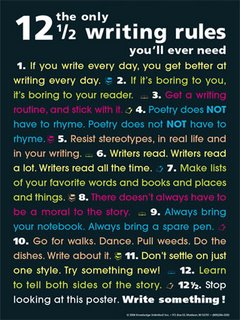1. write 2. write 3. write 4....
(you get the idea. There's also one for reading, too, but I can't find that one, either, or I'd post it)
I'm trying to decide if it's within reason to assign my writing students a "piece" a day, much like NaBloPoMo. If I decide that it IS within reason, I've got to figure out the logistics of such a thing.
**I'm seriously drawn to the idea of using blogging as a tool in the classroom. There's a certain bit of casualness to blogging that, I think, takes a lot of the pressure off of a writer. It's okay to write about stubbing one's toe or about the television show one watched last night on a blog, whereas, I think, there's a certain amount of stress a student feels to pick a "good" topic about which to write for a class. If I understand the objectives of the course correctly, the point is to write, not to write for a specific purpose. I'm thinking that blogging will be a useful environment for that kind of work. Again, I've got to figure out logistics.
**I've been remembering some of the more memorable writing teachers I've had and trying to recall the exercises they gave me, as a student, that helped forward my strength and comfort with the written word. My Freshman English teacher - then a graduate student herself - loved to give us quick, short assignments where we would be expected to respond to a quote or describe an experience or an object or a place. One professor, in particular, was all about responding to short stories or poems. I liked those assignments because they exposed me to a wide variety of writing styles, and I found myself growing more and more comfortable finding and refining my own voice. I still have many of those assignments in the aforementioned file boxes - I may go up and dig them out of the attic for the purposes of memory-refreshing.
**The woman who supervised the second half of my internship is a
phenomenal writing teacher, and I still, to this day, remember some of the assignments she gave me when I was a sophomore in her class at the high school. I learned from her as her intern (or, rather, I re-learned what she taught me when I was a teenager but wasn't paying that much attention) to give the students short prompts and ask them to see where their writing goes without too much interference from themselves. "JUST WRITE," she says, "don't THINK too much; just see where your writing takes you." The students, incredulous at first (all teachers EVER ask us to DO is THINK! She wants us to NOT think?!), quickly discover that they start off writing about one thing - the flowers in the basket on a table in a short story, for example - and end up writing about something VERY different - the time they went to visit their elderly grandmother in the nursing home, and how her room smelled too strongly of rosewater. That is fascinating and important work for writers - to come to what they're really writing about - and it's gratifying to see them edit their own work to hone in on their subject and craft a masterpiece.
**I want my writing students to read, like the graphic above says, a lot and all the time. Seeing how other people use language - how words come together for that
one sparkling sentence that just blows your socks off - is inspirational. I have a TON of material for them to read; it's just a matter of deciding which stories, poems, speeches, blog entries and essays to use.
So, that's my thinking thus far. My biggest concerns, like I said, are figuring out ways to make teaching three composition courses logistically feasible. I'm hoping it doesn't take me too long to settle into a rhythm, and that I'll have some fantastic stories to share with you all here.

 My public speaking students got a real treat today in our guest speaker, and I'm relatively certain none of them knew what hit them.
My public speaking students got a real treat today in our guest speaker, and I'm relatively certain none of them knew what hit them.
 Here, I offer you the words of the great Nathaniel Hawthorne. I have a particular love for good 'ole Nate, mostly because I feel he had a deep and profound insight into what it means to be a New Englander; a Yankee in the truest sense of the word; a native (I love Sarah Orne Jewett for the same reason, but I'll save her for another post). This passage - one of my all-time favorite pieces of writing ever - is taken from The Custom-House, which serves, in most editions, as a preface to The Scarlet Letter. I'm going to give it to you without any editorializing - we can have a conversation about it, if you like, in the comments.
Here, I offer you the words of the great Nathaniel Hawthorne. I have a particular love for good 'ole Nate, mostly because I feel he had a deep and profound insight into what it means to be a New Englander; a Yankee in the truest sense of the word; a native (I love Sarah Orne Jewett for the same reason, but I'll save her for another post). This passage - one of my all-time favorite pieces of writing ever - is taken from The Custom-House, which serves, in most editions, as a preface to The Scarlet Letter. I'm going to give it to you without any editorializing - we can have a conversation about it, if you like, in the comments.


 Joe, my boss at Tiny Community College, called this afternoon and left a message on my machine.
Joe, my boss at Tiny Community College, called this afternoon and left a message on my machine.